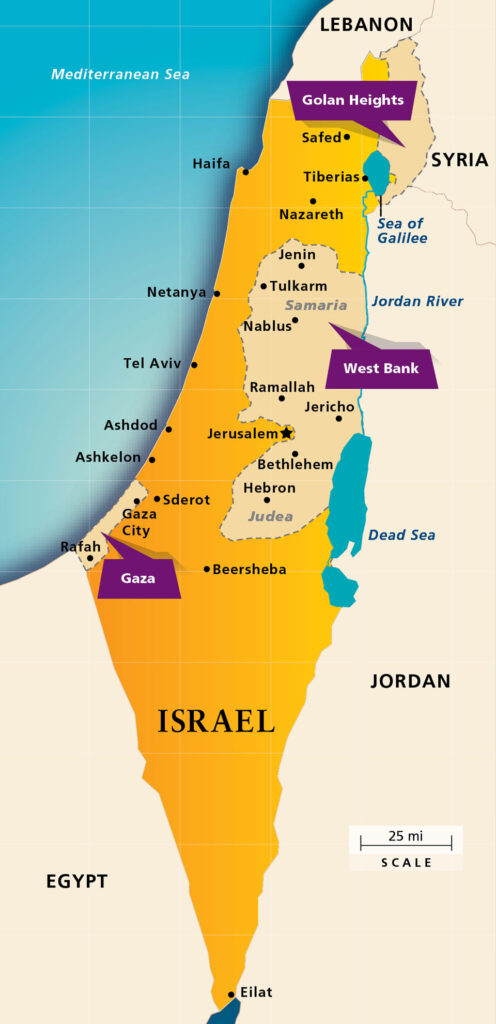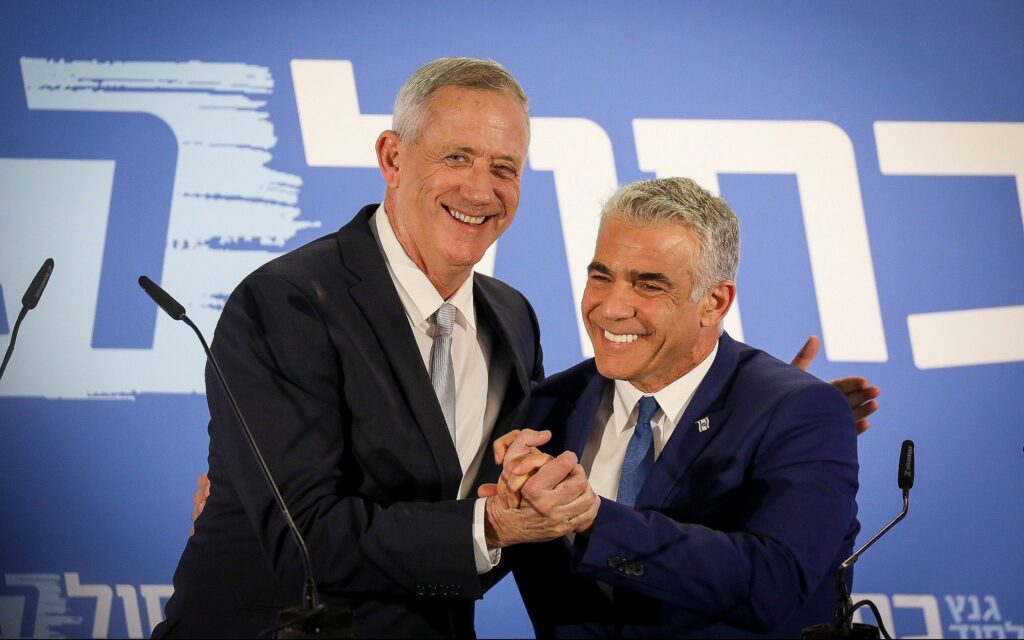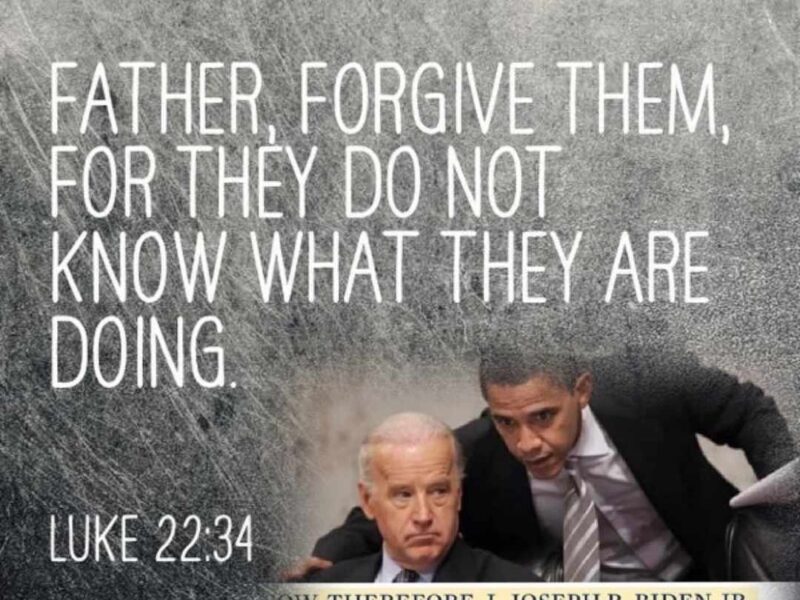Israeli Election: Blue, White, & Bibi
Israeli Prime Minister Benjamin “Bibi” Netanyahu is on course for reelection in spite of significant popular support for the centre-left Blue and White Party. This new party, led by General Benny Gantz and former Finance Minister and journalist Yair Lapid, attempted to present a very real challenge to Bibi Netanyahu’s long run as Prime Minister (PM). Their prospects for victory remain slim, and it looks as though Netanyahu may be able to form a hard-right coalition government even if his party should come in second to the Blue and White List.
The Israeli Parliament
The Knesset, Israel’s parliament, is made up of 120 members who are chosen at least every four years, but sometimes more frequently. In 2015, for example, the governing coalition broke up bringing on new elections only two years after the previous elections. Israel is a multi-party proportional parliamentary system. Voters do not choose individual representatives or the national leader directly, they vote for political party “lists” (lists of candidates made up by homogenous political parties). Parties earn a number of seats based upon their proportion of the total number of votes cast. A party must, however, earn at least 3.25% of the votes in order to clear the threshold to earn seats. It has usually been the case that the party that wins the most seats, wins the election and forms a coalition by knitting together smaller parties. This has not always been the case. In 2009, Netanyahu’s Likud came behind the centre-left Kadima Party. The right-leaning parties, the Right Bloc, won more seats overall than the Left Bloc, and Netanyahu formed the government.

Israel’s Populist
Prime Minister (PM) Bibi Netanyahu is Israel’s most talented politician. He has served in office as PM longer than any previous leader save for David Ben-Gurion, Israel’s founder. If Bibi continues in office through mid-July of this year, he will surpass Ben-Gurion as the longest serving PM overall. Bibi served as Prime Minister after the assassination of Yitzchak Rabin in 1996 until 1999 when a sex scandal drove him from office. He returned to politics as Finance Minister for then-PM Ariel Sharon and soon found his way back into the leadership of the Likud Party. In 2009, ten years after his demise, he returned to office as Prime Minister and has served continuously in that office since then. Bibi has formed several governments of different kinds over the past few terms. He formed a more right-leaning coalition from 2009-13. Then for two years a more centrist coalition prevailed until Yair Lapid collapsed the government in hopes of winning the big office for himself. The 2015 election saw interference from the United States government, as Barack Obama sought Bibi’s ouster. A still more rightwing coalition resulted from that election, but Bibi has held on to office.
The Israeli government recently attempted the same kind of malicious legal tactics against Netanyahu as the American government has against Trump and other popular centre-right western leaders. The Attorney General launched a long investigation into the Prime Minister’s closest associates. The state found some witnesses who claimed that Netanyahu was corrupt. The investigation centered on the Israel-Germany agreement to build Dolphin II class submarines for Israel (based upon the same design as Germany’s new U32). The charges were filed just as the coming election was announced in the hope of diminishing Bibi’s popular support. Since the charges were filed the result has been quite predictable: the witnesses are changing their story, the state’s case is collapsing, and the public is largely uninterested. The investigation and charges have not even made a chink in Bibi’s armour.
Netanyahu has blended the right mixture of populism, emphasis on security, and economic management, helping him retain his position. He has neatly avoided the young nation’s festering social problems, which so many Israelis have been eager to avoid until after the security situation is resolved. The Syrian Civil War and the Iran-backed Hamas terror pseudo-state in the Gaza Strip have been constant reminders to Israelis that they live in an unsafe neighborhood. Stabbings and car attacks within Israel have also antagonized citizens. Hamas has been facing recent protests over their brutal and oppressive rule in Gaza which has led them to attack Israel in hopes of distracting Gazans from their miserable conditions. Rockets have been flying into Israel forcing the world’s only Jewish country to defend itself. President Trump’s recent recognition of Israeli sovereignty over the Golan Heights, which Israel captured from Syria in the 1967 Six Day War, was a welcome development. The heights are essential to Israel’s security. The United States has also relocated its embassy from Tel Aviv to Jerusalem, another major victory for the Jewish State. President Trump and Prime Minister Netanyahu are believed to be on good terms. It is not difficult to see why.

leaders of the centre-left Blue and White Party.
Polls and Likely Outcome
Israeli’s will go to the polls on April 9th to choose the 21st Knesset and 35th Cabinet (government coalition) since the country was formed in 1948, whom will they choose as their leader? Polls are not entirely clear, but the news is generally positive for Prime Minister Netanyahu. The Right Bloc is favored to win 64-65 seats. That means Netanyahu will most likely retain his office, but what are the prospects?

The poll above was conducted by Yedioth Ahranoth, a left-leaning
but relatively trustworthy pollster. Unlike in American politics, the margin of
error in Israeli politics is a little less important because of the
proportional nature of representation. Also, Israelis are rarely shy about answering
for whom they plan to vote, right or left. Likud (Coalition) the main centre-right
party led by Netanyahu should earn 27 seats according to this poll. The Gantz-Lapid
led Blue and White List could earn 31. The movement for the larger parties is slightly
downward since a similar poll several weeks ago. Nevertheless, the Right Bloc
would earn 64 seats if this poll reflected the election results. While the Blue
and White List would earn the greatest number of seats, it would find itself unable
to piece together the 61 seats necessary for a coalition government. A recent
poll conducted by Israel’s Channel 13 found Likud and Blue and White essentially
tied. That poll also asked voters who they preferred for Prime Minister which
was 51% for Netanyahu to 36% for Benny Gantz. These results are hardly a surprise.
There are two and a half probable outcomes of the election, two of which are likely: Netanyahu will govern with a far-right coalition or Netanyahu will govern with a centrist coalition. There is half a possibility that the Blue and White List will be able to form a government, but the current polls make this an unlikely scenario. In order to form a coalition government, the leading parties must make agreements with other parties to work together. They must have enough parties to total at least 61 votes (a majority of 120) in order to form a Minimum Majority Coalition (MMC) necessary to govern effectively in this kind of parliamentary system. Coalitions that include many small parties can become unwieldy, as these smaller more extreme parties can threaten to leave at any time. If the coalition lacks a majority and cannot bring in other parties to establish a majority, then new elections must ensue.
The parties generally found to be on the right, the Right Bloc, will have around 64 or 65 seats if current polls are correct. These include many parties with many different interests, some of which represent small niche segments of Israeli society. The same is true of the Left Bloc. If Blue and White earns more seats than Likud, they could be regarded as the winners. If the Right Bloc wins more seats, however, who will be the coalition partners for Blue and White? Labor is the traditionally centre-left party and is a natural ally of Blue and White. But Labor has not led a government since Ehud Barak’s government collapsed in 2001. They served as a coalition partner in several governments since then, but have not been a serious political force for ten years. As the Aharnoth poll above has it, Labor will have only about 9 seats, a distant third.
Meretz is a long-time leftwing protest party focused on peace at any price and social justice. Meretz polls around 5 seats and has struggled to clear the threshold to win seats in the Knesset in recent elections. According to the poll, these three parties, the natural core of any leftwing government (Blue and White, Labor, and Meretz) will hold about 45 seats. That is still sixteen short of a majority.
The two remaining Left Bloc Parties are Hadash-Ta’al, essentially the Arab Communist Party, and Balad another party that represents the Arab-Israeli minority. Both of these parties would be troublesome in the government as they are not supportive of Israeli security interests and generally seek greater social spending for their constituents; in other words, they can be bought but they are not worth the price. In any case, all told, these Left Bloc parties sum to 56, still a minority. That assumes the Arab parties would be willing to sit in the coalition, it is unlikely that Balad would want to sit in a government led by General Benny Gantz. I must take a moment to note that in Israel the minorities have voting rights and parties in the parliament that represent them. This is not the case in the largely undemocratic Arab countries that surround Israel.
There is one centre-right party not focused on Israel’s security situation that might be willing to join a left coalition: Kulanu (All of Us). Kulanu is led by former Likud Minister Moshe Kahlon. He has served as the Finance Minister in the most recent government. Nevertheless, Kulanu is polling at around 5 seats. None of the parties right of Kulanu would want to sit in this government with so many of the far-left parties. So, if Lapid and Gantz could knit together a weak and extreme-left coalition of the entire Left Bloc and Kulanu they could form a government; and unicorns could descend from the sky. Even if this government came to life, it would not survive even its first real policy test. The first rocket from Gaza, the first minor budget crisis, the first nuanced social policy would cause one partner to flee the coalition and bring on new elections; elections that everyone on the right would hail as an opportunity to return to power.
An Ideal Coalition
Prime Minister Benjamin Netanyahu could knit together a far-right coalition that would be inflexible, extreme, and lack room to maneuvre on questions of peace and social issues. I describe the rightwing parties in greater detail below. Could a better government result? What might the best outcome of this election be? A majority (51%) of Israelis polled by Channel 13 wanted Prime Minister Netanyahu to continue to serve in office to about a third (36%) for Benny Gantz and Yair Lapid of Blue and White. As long as we are entertaining outlandish and utopian possibilities, such as the notion that there is any chance for Blue and White to form a stable government, what if the politicians listened to the voters for a change and formed a unity government (where the two largest parties form a coalition together)? Could Likud and Blue and White come together to govern on behalf of the greatest number of Israelis?
Gantz and Lapid have used some fiery rhetoric against Bibi so it would certainly require them to eat their words. This is no less than they deserve for calling the PM corrupt even as the case against him unraveled before their eyes. Bibi Netanyahu himself would have to be somewhat magnanimous since it is very possible for him to form a hard-right coalition (described below).

Nevertheless, I cannot help but awe at the prospect that a government could be formed made up of both of the leading parties. This has happened before, especially in times of economic or military crisis, so it could happen again. Prime Minister Netanyahu would continue in office as the leader of the government with Benny Gantz as Defense Minister and Yair Lapid perhaps as Foreign Minister, the two offices next in importance to that of the PM. Perhaps Kulanu would join with them so Moshe Kahlon could continue as Finance Minister. Polls show the two largest parties polling close to half of the seats in the Knesset which means they could easily form a government together in coalition with one or two small parties. It is possible that Likud, Blue and White, and Kulanu could be the coalition in and of themselves. The two largest parties would hold all of the government offices and the critical posts. Economic and foreign policy, legislation, and peace negotiations would be handled in a more popular way with them all working together and it would help to groom Gantz and Lapid for future leadership roles. When Netanyahu retires, which may happen after this next term of office, Likud will lurch rightward, opening the possibility of the centre-left reclaiming the national leadership.
Such a coalition would be the best one to receive the Trump Administration’s peace plan which should be introduced later this year. There has never been a better chance of real peace, as all of the necessary circumstances have slowly come into place: the United States has a strong pro-Israel administration, the Arab states are warming to Israel as an ally against Iran (and thus pressuring the Palestinians toward peace), and the Iran-backed terror pseudo-state in Gaza, Hamas, is facing internal protests against its oppressive rule. A hard right coalition would lack the flexibility to entertain a peace plan, but a more centrist coalition, one more to the liking of the greater number of Israeli voters, would be able to reach compromises and agreements on many issues.
An Extreme Right Coalition
It is more likely that Netanyahu could knit together all of the rightwing parties. The Right Bloc includes several parties very close to Prime Minister Netanyahu, who have a good working relationship and a long history with him. Yisrael Beteinu (Israel is Our Home – YB) is led by former Defense Minister and long-time Netanyahu coalition partner Avigdor Liberman. YB was formed to represent the many Russian and Eastern European Jews who immigrated to the country in the 1990’s. This party is right-leaning and secular, eager for Israel to take a strong defensive posture. Kulanu (All of Us) is a centre-right party led by Moshe Kahlon and is focused on fiscal and social issues (as discussed above). Economy Minister Naftali Bennett and Justice Minister Ayalet Shaked recently departed the National Union-Jewish Home Party to form a new party called Hayamim Hahadash (New Right). They are both close to Bibi and can be counted upon to join his coalition. The National Union – Bayit HaYehudi (Jewish Home) Party is a partnership of two rightwing parties that represent primarily the residents of Shomron and Yehudah (Samaria and Judea – often called the West Bank) and Israeli rightists. This party has recently added the Otzmah Yehudit (Jewish Power) Party with Netanyahu’s blessing. Otzmah is a Kahanist party dedicated to the forcible removal of Arab residents from West Bank. It is the kind of party that makes many Jews uncomfortable, as it calls for Jews to commit the kinds of horrors of which Jews themselves have often been the victims. This new amalgamation of three parties is called the Union of Rightwing Parties.
Finally, the surprise on the right this year, is the Zehut (Identity) Party which is a libertarian party led by long-time rightwing gadfly Moshe Feiglin. The party has rocketed from nowhere to perhaps five seats in recent weeks. Many American immigrants to Israel and residents of Shomron and Yehudah have been calling for less government power. There is now a party dedicated to that end. Zehut would require the legalization of cannabis as a condition of joining any coalition. Cannabis is illegal in Israel although the laws are fairly lax and it has been widely tolerated by law enforcement.
There are also two parties representing the ultra-orthodox (Haredi) Jews, United Torah Judaism (UTJ) and Shas (essentially—Talmud) who seek large social welfare benefits, special legal privileges, and to force quirky religious laws upon the largely secular population. These parties have long been kingmakers in Israeli politics so they are accustomed to getting what they want. Thus, about 2/3rds of Haredi men study in religious schools instead of working, do not serve in the military (all Israelis are subject to conscription), and they consume a large percentage of Israeli social benefits. Yair Lapid of Blue and White has been an outspoken opponent of special privileges and benefits for this constituency, so they are not likely to be willing to join his government. Bibi has a long relationship with them and they have been able to work well with him in the past. There is every indication that UTJ and Shas would gratefully join another Netanyahu government. Their absence from a unity government, described above, would perhaps be the greatest blessing of such a scenario.







